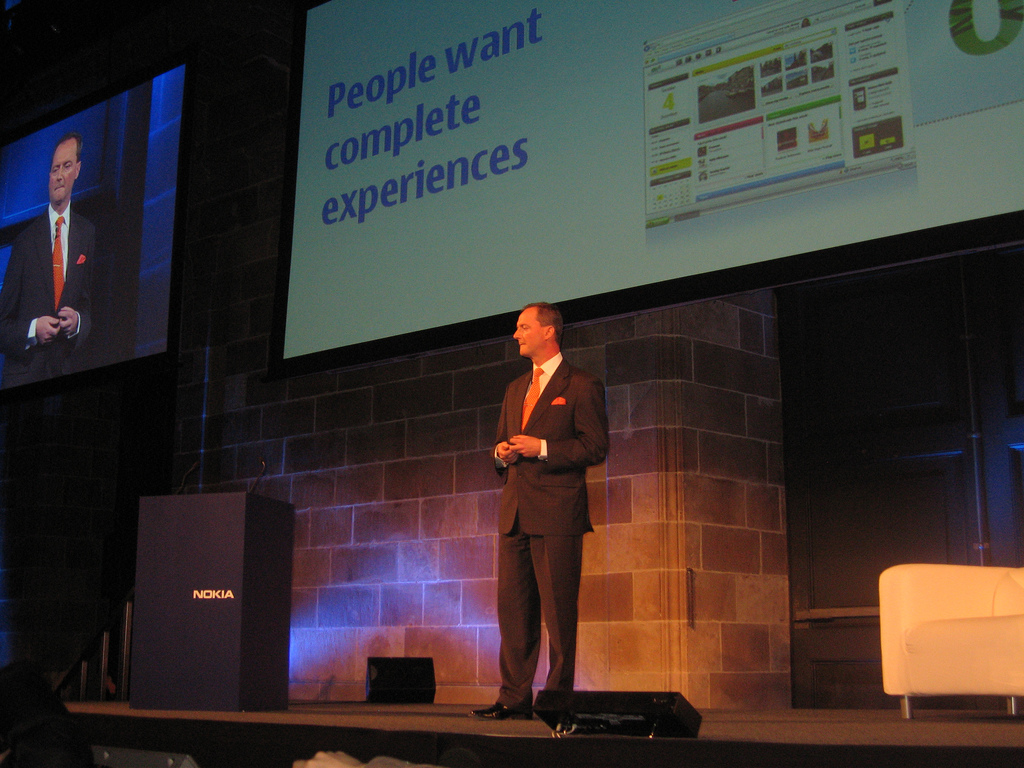Are mobile networks feeling the squeeze?
OS providers and handset manufacturers are giving us more. What's left over?

We talked to a lot of people at Mobile World Congress. A hell of a lot of people. And, aside from questioning who will buy Android-based phones, the one major thing they were questioning is the future role of the mobile networks.
Up until now, they’ve had a pretty clear run to offer whatever add-on services they’ve wanted to. Like photo-sharing, for example. But the desire for handset manufacturers and OS providers to provide “software and services” means that network services are feeling the squeeze from all sides.
Mobile email is one place this is happening. You don’t need it from Orange or Vodafone when you can get it free from Google, for example. And then there’s a middle-man like Yahoo Mobile, which means you’d never have to visit Orange World or Vodafone Live should you want the latest football scores, weather or news.
Networks can be a 'roadblock'
As an OS and services provider, Microsoft is surely one of those squeezing the networks slice of the pie. Windows Mobile group product manager John Starkweather told us that the relationship with networks can often be interesting for service providers and they can often be a ‘roadblock’ in terms of launching features. “When you have a service that is dependent upon a network operator, you’re always going to have interesting conversations about who owns the customer, revenue share, branding, all these things.”
But in terms of working with networks over services like IM, give and take is the name of the game, he adds. “It’s important you have flexibility with the mobile operator depending on their model,” says Starkweather, citing the examples of T-Mobile in the US which was happy to have Windows Live branding on services, and Vodafone Live which uses Microsoft’s IM system but with Vodafone branding.
“We’ve taken a lot of time talking to mobile operators to open up their networks to IM. A few years ago they were really worried about it and they thought that [it] would chew into really lucrative SMS revenues. We’re turning a corner, seeing more and more operators, all the big players are opening up to IM."
Get daily insight, inspiration and deals in your inbox
Sign up for breaking news, reviews, opinion, top tech deals, and more.
The impact of Ovi
As for handset manufacturers, they’re in for an interesting time, too. Another threat to network revenues comes in the form of Nokia’s new Ovi platform, the first phase of which will enable users to share content between computers, phones and other devices in 100 different file formats.
“Nokia has an interesting road ahead,” says Starkweather. “Ovi really is version two of Club Nokia, which has its challenges. Nokia has done some great work. They’ve made some really impressive acquisitions and we’ve got a lot of respect for them as a company.”
But some executives believe the industry can’t afford to let networks suffer in the squeeze. Qualcomm's chief operating officer, Sanjay Jha, told us it would be “a very poor thing for the whole industry” if networks got a smaller slice of the pie. “I think [that] if you look at the level of investment that’s required in spectrum and network, you want someone to have the operating profit to invest,” says Jha. He has a point.
"[It's] happening with the introduction of iPhone, with the Android initiative with Google and Microsoft…in a lot of ways in the old days the carriers defined the software environment and the feature set of the handset. I think you’re seeing an opening up of that environment. A lot of phones [are] independent of carriers," continued Jha. "Previously the wireless carriers haven’t been open to having devices like this, because they think it turns them into a bit pipe."
Networks want to do something about this. Indeed, the news broke yesterday that Vodafone has stolen one of Microsoft’s key mobile execs to head up its internet services division.
Pieter Knook was a senior vice president at Microsoft and was far enough up the Microsoft tree to deliver part of the corporation’s World Mobile Congress keynote on Monday alongside Robbie Bach.
According to Vodafone, Knook will be responsible for “delivering new revenue growth around internet, content and advertising with a focus on differentiating Vodafone’s services by creating rich and distinctive experiences for customers.” Some task then.
Dan (Twitter, Google+) is TechRadar's Former Deputy Editor and is now in charge at our sister site T3.com. Covering all things computing, internet and mobile he's a seasoned regular at major tech shows such as CES, IFA and Mobile World Congress. Dan has also been a tech expert for many outlets including BBC Radio 4, 5Live and the World Service, The Sun and ITV News.